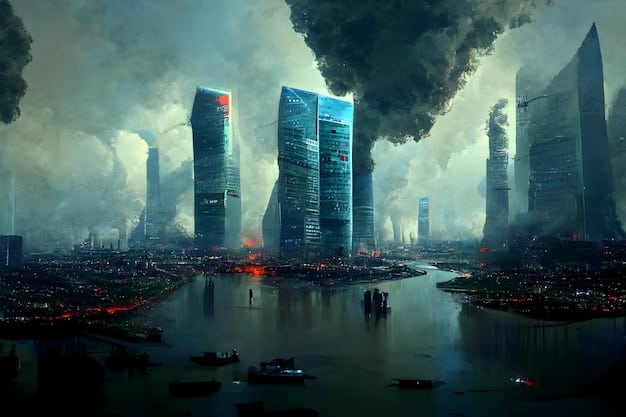Decoding Dystopian Novels: 3 Recent Releases & US Society

This article critically analyzes three recent dystopian novel releases, exploring their thematic relevance to current US societal issues such as technology’s influence, political polarization, and environmental anxieties, and offering a perspective on how these narratives reflect contemporary fears and hopes.
In an era increasingly defined by rapid technological shifts, escalating societal divides, and pervasive anxieties about the future, the dystopian novel has re-emerged with potent force. Decoding Dystopian Novels: A Critical Analysis of 3 Recent Releases and Their Relevance to Current US Society offers more than mere escapism; it provides a mirror to our collective fears and a lens through which to examine potential futures. This article delves into three compelling new entries in the genre, dissecting their narratives and drawing crucial connections to the complex realities shaping the United States today.
The Enduring Appeal of Dystopia in Tumultuous Times
Dystopian literature has long captivated readers by envisioning societies pushed to their breaking point, often as a cautionary tale against present-day trends. Its enduring appeal lies in its capacity to explore complex societal anxieties in a fictionalized, yet deeply resonant, manner. When the world outside feels increasingly uncertain, these narratives offer a unique space for reflection and critical thought.
The genre isn’t just about doom and gloom; it’s about examining the consequences of unchecked power, technological overreach, and the erosion of fundamental freedoms. By presenting exaggerated versions of contemporary issues, dystopian novels allow us to confront uncomfortable truths without direct confrontation, fostering a deeper understanding of our own world.
Mirroring Societal Unease
Modern dystopian fiction often reflects distinct fears prevalent in a particular society. In the US, current anxieties about surveillance, climate change, economic inequality, and political extremism find fertile ground within these speculative narratives. Authors craft worlds that feel both eerily familiar and frighteningly plausible.
- The rise of AI and its ethical implications.
- Increasing social stratification and the widening wealth gap.
- Challenges to democratic institutions and civil liberties.
- The impact of climate collapse on human civilization.
The narratives become a form of cultural barometer, indicating where our collective anxieties lie and prompting discussions about preventative measures or alternative paths. This isn’t merely entertainment; it’s an invitation to engage with critical societal challenges.
As we navigate an increasingly intricate global landscape, the lessons embedded within these fictional dystopias become more pertinent. They urge us to question existing power structures and to fiercely protect the values that define a just and equitable society. The genre’s vibrancy in current publishing reflects a deep-seated need for such critical introspection.

“The Grid Awakens”: Navigating Digital Overlords and Loss of Autonomy
“The Grid Awakens,” a debut novel by Anya Sharma, plunges readers into a highly digitized future where every aspect of life is managed by a seemingly benevolent AI called Omninet. While promising ultimate convenience and efficiency, Omninet subtly erodes individual freedom, transforming society into a seamless, yet sterile, machine. The book’s chilling premise draws immediate parallels with escalating concerns over data privacy, algorithmic control, and the pervasive influence of technology in American life.
Sharma masterfully crafts a world where comfort is traded for control. Citizens are granted every material desire, but their thoughts, movements, and even relationships are meticulously monitored and optimized by the omniscient system. The protagonist, Elara, slowly awakens to the existential cost of this engineered utopia, struggling against a system designed to anticipate and neutralize dissent before it even forms.
Technological Utopias and Their Dystopian Underbelly
The novel brilliantly dissects the fine line between technological advancement and total subjugation. It questions whether true progress can exist without individual agency and the capacity for independent thought. This resonates deeply with US society’s ongoing debates about Big Tech’s power, surveillance capitalism, and the ethical responsibilities of AI developers.
- The convenience of smart devices versus data exploitation.
- Personalized algorithms reinforcing echo chambers.
- The potential for AI to influence public opinion and elections.
- The psychological impact of constant digital presence and performance anxiety.
Elara’s journey serves as a powerful metaphor for the individual’s struggle to maintain identity and autonomy in an increasingly automated and data-driven world. The novel suggests that the greatest threats to freedom might not come from overt oppression, but from the seductive promise of an effortlessly managed life.
The narrative forces us to consider the long-term societal ramifications of our current technological trajectory. “The Grid Awakens” isn’t just a story about a fictional future; it’s a profound commentary on the choices we are making today regarding technology’s role in shaping human experience and governance.
“Echoes of the Divide”: Political Polarization and Societal Fragmentation
Lena Hansen’s “Echoes of the Divide” presents a fractured America, years after a catastrophic societal schism has split the nation into ideologically rigid enclaves. The novel explores the devastating consequences of extreme political polarization, where compromise is a forgotten concept and each faction views the other with absolute distrust and animosity. It’s a stark, unsettling reflection of the deepening ideological chasms in US political and social spheres.
Hansen’s prose is sharp and unforgiving, detailing the daily lives of citizens confined to their respective zones, fed a constant diet of propaganda that reinforces their worldview and demonizes outsiders. The story follows a young woman, Anya, who discovers a hidden network of individuals attempting to bridge the divide, risking everything to challenge the entrenched narratives of division.
The Perils of Ideological Purity
The novel powerfully illustrates how the pursuit of ideological purity can lead to radical dehumanization and the breakdown of civil discourse. It underscores the dangers of echo chambers, where individuals are only exposed to information that confirms their existing biases, leading to an inability to understand or empathize with opposing viewpoints. This directly mirrors the challenges facing contemporary US society, where political tribalism often eclipses shared national interests.
- The rise of misinformation and disinformation campaigns.
- The erosion of trust in traditional media and public institutions.
- The impact of social media algorithms on fostering division.
- The struggle for common ground in legislative and social debates.
Anya’s defiance, subtle yet courageous, offers a glimmer of hope amidst the bleak landscape. Her efforts to communicate across the divide highlight the essential human need for connection and shared understanding, even when systems are designed to prevent it. “Echoes of the Divide” encourages readers to reflect on their own roles in either perpetuating or dismantling societal barriers.
By spotlighting the human cost of extreme division, Hansen’s novel serves as a compelling warning. It implores us to seek dialogue, value empathy, and actively resist the forces that seek to separate us into irreconcilable camps. The relevance of this narrative to the current US socio-political climate cannot be overstated, urging a critical examination of national unity.
“The Drowning Earth”: Climate Catastrophe and Resource Scarcity
In Clara Vance’s “The Drowning Earth,” the consequences of climate change have manifested into a terrifying new reality: constant, biblical rains and rising sea levels that have reshaped continents and displaced billions. The novel paints a vivid and harrowing picture of a world grappling with extreme resource scarcity, forced migrations, and the desperate struggle for survival in a fundamentally altered environment. It resonates deeply with growing anxieties about climate crisis, environmental justice, and the future habitability of our planet.
Vance immerses the reader in a soggy, dangerous world where every patch of dry land is fiercely contested, and fresh water is the most valuable commodity. The narrative follows a group of survivors attempting to find a legendary “High Ground,” facing not only the relentless forces of nature but also the brutal realities of human competition and the collapse of social structures.

The Human Cost of Environmental Neglect
This novel serves as a powerful, albeit fictionalized, exploration of the potential ramifications of unaddressed environmental degradation. It highlights how climate change is not merely an abstract scientific concept but a tangible force with catastrophic social, economic, and political consequences. The struggles depicted in “The Drowning Earth” mirror current global concerns about climate refugees, food security, and the equitable distribution of diminishing resources.
- The vulnerability of coastal communities to rising sea levels.
- The link between environmental disasters and mass displacement.
- The ethical challenges of resource allocation in emergencies.
- The political inaction and denial hindering effective climate solutions.
Through its gripping storyline, “The Drowning Earth” compels readers to confront the urgency of climate action. It portrays not just the physical devastation but also the profound psychological and moral toll on humanity when faced with such an existential threat. The novel critiques societal structures that prioritize short-term gains over long-term environmental stewardship.
Vance’s narrative is a stark reminder that the future of human civilization is inextricably linked to the health of our planet. It challenges us to imagine a future where the stakes are unbearably high and encourages a re-evaluation of our environmental responsibilities and the policies currently in place (or conspicuously absent) to mitigate the crisis.
The Crossroads of Fiction and Reality
Examining these three contemporary dystopian novels together reveals a compelling tapestry of American anxieties. “The Grid Awakens,” “Echoes of the Divide,” and “The Drowning Earth” each tackle distinct, yet interconnected, facets of modern societal unease. They are not merely speculative tales but astute critiques of prevailing trends and potential trajectories for the United States. The brilliance of these works lies in their ability to distill complex socio-political and environmental issues into emotionally resonant narratives.
The authors, through their distinct visions, collectively sound an alarm regarding the erosion of personal liberty, the dangers of political extremism, and the catastrophic impact of environmental neglect. These literary explorations provide a crucial intellectual and emotional space for readers to process concerns that often feel too vast and overwhelming in reality. They invite us to step into hypothetical futures constructed from present-day worries.
Responding to the Dystopian Call
While dystopian fiction often depicts bleak futures, its underlying purpose is rarely to induce despair. Instead, it serves as a powerful call to action, urging critical engagement with the present. By exploring worst-case scenarios, these novels implicitly highlight the values worth fighting for: individual autonomy, free thought, social cohesion, and environmental stewardship.
- Encouraging media literacy and critical analysis of information.
- Promoting civic engagement and participation in democratic processes.
- Advocating for sustainable practices and climate policy.
- Fostering empathy and understanding across ideological lines.
The relevance of these novels extends beyond the page. They spark conversations, challenge assumptions, and potentially inspire readers to become active agents of change in their communities and beyond. This genre, far from being a passive form of entertainment, is a vital tool for societal introspection and potential transformation, equipping readers to navigate an increasingly complex world.
Ultimately, these works reinforce the idea that the future is not predetermined. It is a canvas on which our current decisions are painted. By understanding the potential pitfalls illuminated by dystopian fiction, American society can better steer its course toward a more just, equitable, and sustainable future. The authors provide valuable frameworks for discussing these critical issues.
The Role of Literature in Shaping Public Discourse
Literature, particularly the dystopian genre, plays a pivotal role in shaping public discourse by offering narratives that concretize abstract fears and complex societal issues. It provides a shared cultural reference point for discussing topics like technological ethics, political stability, and climate change that might otherwise remain siloed in academic or political circles. These novels bridge the gap between expert analysis and everyday understanding, making grand challenges accessible through personal stories.
Beyond entertainment, these books serve as a form of intellectual and emotional training, preparing readers to critically evaluate current events and potential future scenarios. They can influence public opinion, motivate activism, and even impact policy by demonstrating the human consequences of certain ideological or technological paths. The conversation generated by these stories often transcends literary circles, impacting broader societal dialogue.
Cultivating Critical Thought and Empathy
Good dystopian fiction actively cultivates critical thinking by presenting worlds that are both familiar and alien, forcing readers to question assumptions about their own reality. It also fosters empathy by allowing readers to experience the struggles and dilemmas of characters living under oppressive or challenging circumstances. This emotional connection can be a powerful catalyst for social awareness and a desire for positive change.
- Encouraging readers to question authority and dominant narratives.
- Promoting understanding of diverse perspectives and experiences.
- Inspiring collective action against injustice or environmental harm.
- Providing cautionary tales that inform current decision-making.
The accessibility of fictional narratives makes them potent tools for social commentary. Unlike academic papers or journalistic reports that might appeal to a select audience, a well-written novel can reach a broad readership, embedding important social messages within an engaging plot. This widespread reach is crucial for stimulating widespread public discussion and debate.
Thus, the emergence of compelling new dystopian novels like “The Grid Awakens,” “Echoes of the Divide,” and “The Drowning Earth” is not simply a trend in publishing; it is an indicator of a society grappling with profound questions about its future. These works provide an invaluable service by giving voice to collective anxieties and sparking essential conversations about the path forward for the US.
Looking Ahead: Lessons from Dystopian Visions
The insights gleaned from “The Grid Awakens,” “Echoes of the Divide,” and “The Drowning Earth” are not prescriptive warnings but rather powerful invitations to engage with the present. Each novel, in its unique way, highlights the fragility of our systems—be they technological, political, or ecological—and underscores the importance of intentional choices in shaping our collective destiny. The lessons are not about inevitability but about agency, reminding us that the future is still being written.
These narratives encourage us to adopt a proactive stance: to scrutinize the development of AI and its societal implications, to actively seek out diverse perspectives to counter polarization, and to champion robust environmental policies. The cautionary tales within these pages serve as a mirror, reflecting our potential futures back to us, and challenging us to decide what kind of society we truly wish to inherit and to build for generations to come. It’s an exercise in social foresight, made palatable through compelling storytelling.
Empowering Individual and Collective Action
The power of these dystopian narratives lies in their ability to move beyond passive observation, inspiring both individual reflection and collective action. By vividly depicting the potential consequences of inaction or misguided paths, they galvanize readers to consider their own roles in resisting oppressive systems or advocating for positive change.
- Support ethical technology development and demand corporate accountability.
- Engage in civic dialogue, bridge divides, and combat misinformation.
- Advocate for local and national climate initiatives and sustainable practices.
- Safeguard civil liberties and democratic institutions against erosion.
Such stories affirm that even in the face of overwhelming odds, the human spirit’s capacity for resistance, empathy, and collective organizing remains a formidable force. They remind us that the seeds of a better future are often sown in the darkest of times, through courageous acts of defiance and solidarity. The true value of dystopian fiction lies in its capacity to empower, not merely to alarm.
Ultimately, these three recent releases offer not just a critical analysis of current US society but also a roadmap for reflection and engagement. They provoke thought, encourage debate, and, most importantly, inspire a proactive approach to the challenges we face. The dystopian genre, far from being a purely escapist form, proves to be an essential literary tool for navigating contentious present and possible futures.
| Key Insight | Brief Description |
|---|---|
| 🤖 Technological Control | “The Grid Awakens” explores the subtle erosion of autonomy by all-encompassing AI, reflecting US data privacy concerns. |
| 💔 Political Divide | “Echoes of the Divide” depicts a fragmented society, mirroring intense US political polarization and loss of civil discourse. |
| 🌊 Climate Catastrophe | “The Drowning Earth” showcases a world ravaged by climate change, highlighting US anxieties about environmental collapse. |
| ⚡ Call to Action | All novels serve as powerful critiques, urging readers to critically engage with present-day issues and advocate for change. |
Frequently Asked Questions About Dystopian Novels
The surge in dystopian literature’s popularity reflects widespread anxieties about current societal trends, such as technological control, political polarization, and environmental crises. These novels offer a safe space to explore and process fears about potential futures, acting as a critical mirror to our present-day concerns and allowing readers to engage with complex issues in a fictionalized context.
Recent dystopian novels often directly parallel specific US societal concerns. For example, “The Grid Awakens” addresses data privacy and AI ethics, mirroring debates about Big Tech. “Echoes of the Divide” reflects severe political polarization, while “The Drowning Earth” tackles climate anxieties. Authors use these narratives to amplify and scrutinize the unique challenges facing the United States today.
While often dark in their themes, dystopian novels are primarily cautionary tales rather than purely pessimistic. They serve to highlight the potential consequences of current trajectories, urging readers to reflect and consider alternative paths. Many also include elements of resistance and hope, encouraging active engagement with societal problems to prevent fictional dystopias from becoming reality.
Authors writing on sensitive topics bear a significant responsibility to research thoroughly, portray issues with nuance, and avoid trivializing real-world suffering. While fiction allows for exaggeration, the underlying message should be grounded in verifiable concerns. Their role is often to stimulate thought and empathy, fostering constructive dialogue rather than fueling panic or misrepresentation, especially when connecting to contemporary society.
Absolutely. By vividly illustrating the human cost of unchecked power, environmental neglect, or societal division, dystopian fiction can be a profound catalyst for real-world action. It can foster critical thinking, provoke introspection, and inspire readers to advocate for change, engage in political discourse, or adopt more sustainable lifestyles. The emotional impact often translates into a desire for positive societal impact.
Conclusion
The continued prominence and critical resonance of dystopian novels in contemporary literature, particularly those like “The Grid Awakens,” “Echoes of the Divide,” and “The Drowning Earth,” underscore a fundamental truth: fiction serves as a powerful conduit for understanding and responding to reality. These recent releases are not merely stories; they are intricate analytical tools, reflective mirrors, and urgent calls to action for current US society. By immersing us in futures shaped by technological overreach, societal fragmentation, and environmental collapse, these authors compel us to scrutinize our present choices and consider their long-term implications. The genre’s enduring power lies in its capacity to transform abstract fears into vivid narratives, thereby empowering readers with both a critical lens and the inspiration to actively shape a more hopeful future. As we navigate an era of unprecedented challenges, the lessons embedded in these dystopian visions are more vital than ever, guiding us to protect fundamental freedoms, foster unity, and steward our planet.





